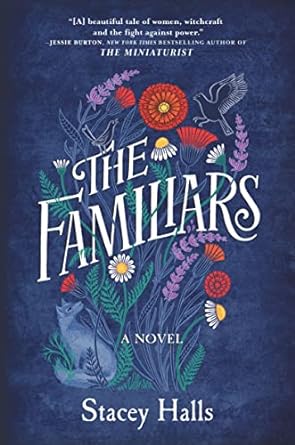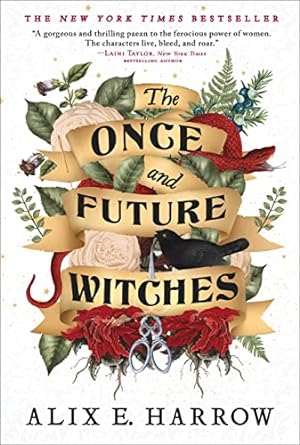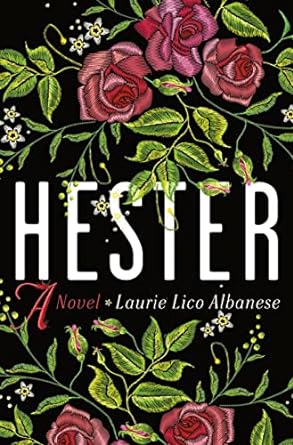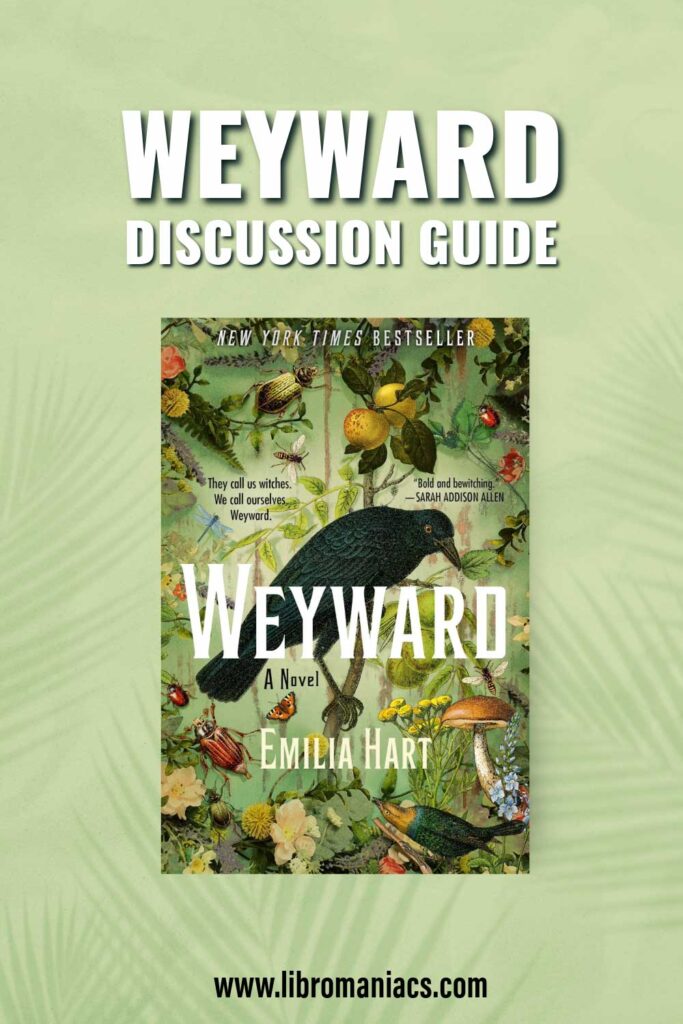Reading Weyward for your book club will provoke a thoughtful discussion about this bewitching story, which combines historical fiction, magical realism, and modern feminism. A cross-generational plot following the lives of three women over centuries, Hart poetically displays that female resilience conquers oppression, abuse, and silence. The book’s themes include gender oppression and power struggles under patriarchy, the power of female solidarity, and love versus fear.
Reviews of this book have been very binary, and you may find the same with your book club. We’ll help you navigate that with these Weyward book club questions. This complete discussion guide features a book synopsis, ten book club questions, and some selected reviews. At the very end of the guide we have also provided suggestions for books similar to Weyward (for those of you who loved it!)

(This article contains affiliate links. This means that if you choose to purchase, I’ll make a small commission.)
Weyward Synopsis
(We always chose to provide the publisher synopsis because we feel that it’s worthwhile to discuss whether the official book description actually squared with your experience of the book.)
Weyward, Emilia Hart
2019: Under cover of darkness, Kate flees London for ramshackle Weyward Cottage, inherited from a great-aunt she barely remembers. With its tumbling ivy and overgrown garden, the cottage is worlds away from the abusive partner who tormented Kate. But she suspects that her great-aunt had a secret. One that lurks in the bones of the cottage, hidden ever since the witch-hunts of the 17th century.
1619: Altha is awaiting trial for the murder of a local farmer who was stampeded to death by his herd. When Altha was a girl, her mother taught her their magic, a kind not rooted in spell casting but in a deep knowledge of the natural world. But unusual women have always been deemed dangerous, and as the evidence of witchcraft is laid out against Altha, she knows it will take all her powers to maintain her freedom.
1942: As World War II rages, Violet is trapped in her family’s grand, crumbling estate. Straitjacketed by societal convention, she longs for the robust education her brother receives––and for her mother, long deceased, who was rumored to have gone mad before her death. The only traces Violet has of her are a locket bearing the initial W and the word weyward scratched into the baseboard of her bedroom.
Weaving together the stories of three extraordinary women across five centuries, Emilia Hart’s Weyward is an astonishing debut, and an enthralling novel of female resilience.
Weyward Book Club Questions
These questions have been tailored to this book’s specific reading experience, but if you want more ideas, we also have an article with 101 generic book club questions.
- The Weyward women are often at odds with the patriarchal figures in their lives. How do the Weyward women’s responses to male oppression reflect changing societal attitudes across the centuries? Are there parallels in their struggles to those of women today?
- The novel portrays generational cycles of domestic abuse. Do you believe the cycle is broken by the end of the book? Why or why not? Which moments made you hopeful or skeptical about the future of the Weyward women?
- “I had nature in my heart, she said. Like she did, and her mother before her. There was something about us–the Weyward women–that bonded us more tightly with the natural world. We can feel it, she said, the same way we feel rage, sorrow, or joy. The animals, the birds, the plants–they let us in, recognizing us as one of their own.”
The theme of female solidarity is highlighted throughout the novel. Why does Hart make it so vital for female characters to connect with each other?
- One of the key themes in the novel is love versus fear. Fear itself is an important arsenal of male domination. How do the men in the story use it to control their women? Are the Weyward women motivated by love or fear?
- Think about the male characters in the story; Frederick, Lord Rupert, and Simon. What traits do they have in common? How is each one defeated by the Weyward women?
- “We never thought of ourselves as witches, my mother and I. For this was a word invented by men, a word that brings power to those who speak it, not those it describes. A word that builds gallows and pyres, turns breathing women into corpses.”
How has the word “witch” changed in the centuries since Altha’s trial in 1619? What does this change suggest about contemporary attitudes toward powerful women and nature?
- The novel approaches the idea of hidden messages as a vital tool for survival and solidarity among women. Did you find this motif inspiring or tragic, and how did it enhance your understanding of women’s experiences in the time periods depicted?
- “It is as if she had been in hiding–like the insects–dormant and docile until she came to Weyward Cottage. There could be others like her, in need of waking[…] Perhaps something has survived, in the dark, hidden places where men dare not look.”
How do you interpret the role of Weyward women breaking free from the social norms of their respective times? Is their wilderness a form of resistance or a search for self-determination?
- Elements of nature are found throughout the novel, particularly birds and insects, which are often used by Weyward women as an act of retaliation and defiance against their oppressors. What do you think the author wants us to learn about the power dynamics between love, fear, and domination with this symbolism?
- Atha decides to document her secret powers, do you consider it a dangerous defiance or a necessity for the survival of her lineage? What impact did her journal have on Violet and Kate’s life? How would their lives be different if Altha hadn’t recorded her life in a journal?
Selected Reviews forWeyward
(Use these selected Goodreads reviews to compare with your own experience of the book. Do you agree or disagree with the reviews?)
“Okay, I see why this is so popular. The writing is lush but stops short of purple prose. The three storylines wend and weave together fairly seamlessly, with short chapters that draw you in and keep you guessing. Even though I felt that the Big Reveals and final showdowns were more of a letdown than anything, the journey was fun and kept me engaged.”
“I don’t give books one star often, I’m fairly easy to please as a reader and quick to give praise but this book enraged me. Firstly it should come with a trigger warning larger than the title, because this book contains almost all the different ways women can be abused by men and other triggering scenarios – rape (on and off the page), domestic violence of varying aggression, a forced hysterectomy, attempted suicide, self administered abortions, car crashes and neglect/abusive parenting. I’m sure I’ve missed something from the list but basically any way a woman can be treated like dirt is here…”
“What an amazing debut novel from Emilia Hart! She chronicles the stories of three women from different centuries (17th-21st) and the adversities they face as ‘witch’ women with abnormal powers. Each of the three stories overlaps at a pivotal moment for the present-day protagonist, who finds out about her heritage and rediscovers who she is. This is a great book for historical fiction and light fantasy fans.”
“Not sure what drew me to this book, perhaps the gorgeous cover. But it came up at just the right time for some more laid-back reading despite the dark subject matter. May have too much magical realism for some, but I liked it and its subjects for a change of pace. The theme of women finding their inner power and strengths followed nicely on the tails of two previous books in the same vein, more challenging in nature. Very picturesque prose in this one that flowed nicely.”
Books Similar to Weyward
If you’re keen for a multi-gen female-driven story with a curse at the center…try The Unmaking of June Farrow. For a then-and-now comparison of women doing what they have to deal with abuse and the patriarchy, try The Lost Apothecary. Or how about a six generation story about inherited trauma and how to break the cycle…The Many Daughters of Afong Moy. Each of these discussion guides has a book synopsis toward the top of the article.
And here are few more ideas for you:

The Familiars: A Novel, Stacey Halls
This bewitching novel tells the story of Fleetwood, a young noblewoman and her midwife, Alice Gray, being caught up in trials for witchcraft. The main book’s themes found throughout the story include rights of women in the 17th century, prejudice against wise women, and the roles played during the witch hunt.

The Once and Future Witches, Alix E. Harrow
A story about three sisters joining the American suffrage movement to fight for women’s rights in a world where witches don’t exist but used to. The main book’s themes used throughout the story include patriarchal abuses of power, the strength in solidarity, and covert women’s resistance.

Hester: A Novel, Laurie Lico Albanese
This novel reimagines The Scarlet Letter. Set in Salem right after the witch trials, a Scottish seamstress, Isobel, comes to America to start fresh but finds trouble.
The central book’s themes used throughout the novel include fictionalizing history and historicizing fiction, gendered burden of family history, and feminist reimagination.
Share these Weyward book club questions with your friends:

